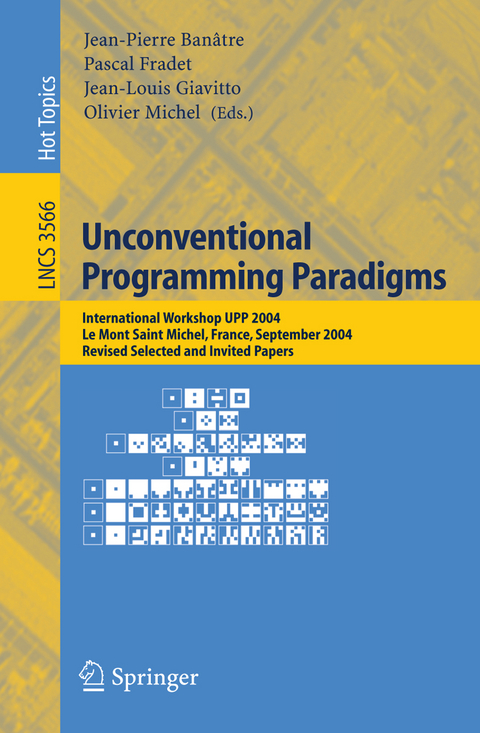
Unconventional Programming Paradigms
Springer Berlin (Verlag)
978-3-540-27884-9 (ISBN)
Invited Talk.- From Quantum Physics to Programming Languages: A Process Algebraic Approach.- Chemical Computing.- Chemical Computing.- Programming Reaction-Diffusion Processors.- From Prescriptive Programming of Solid-State Devices to Orchestrated Self-organisation of Informed Matter.- Relational Growth Grammars - A Graph Rewriting Approach to Dynamical Systems with a Dynamical Structure.- A New Programming Paradigm Inspired by Artificial Chemistries.- Higher-Order Chemical Programming Style.- Amorphous Computing.- to Amorphous Computing.- Abstractions for Directing Self-organising Patterns.- Programming an Amorphous Computational Medium.- Computations in Space and Space in Computations.- Bio-inspired Computing.- Bio-inspired Computing Paradigms (Natural Computing).- Inverse Design of Cellular Automata by Genetic Algorithms: An Unconventional Programming Paradigm.- Design, Simulation, and Experimental Demonstration of Self-assembled DNA Nanostructures and Motors.- Membrane Systems: A Quick Introduction.- Cellular Meta-programming over Membranes.- Modelling Dynamically Organised Colonies of Bio-entities.- P Systems: Some Recent Results and Research Problems.- Outlining an Unconventional, Adaptive, and Particle-Based Reconfigurable Computer Architecture.- Autonomic Computing.- Autonomic Computing: An Overview.- Enabling Autonomic Grid Applications: Dynamic Composition, Coordination and Interaction.- Grassroots Approach to Self-management in Large-Scale Distributed Systems.- Autonomic Runtime System for Large Scale Parallel and Distributed Applications.- Generative Programming.- Towards Generative Programming.- Overview of Generative Software Development.- A Comparison of Program Generation with Aspect-Oriented Programming.- Generative Programming from a PostObject-Oriented Programming Viewpoint.
| Erscheint lt. Verlag | 15.7.2005 |
|---|---|
| Reihe/Serie | Lecture Notes in Computer Science | Theoretical Computer Science and General Issues |
| Zusatzinfo | XI, 367 p. |
| Verlagsort | Berlin |
| Sprache | englisch |
| Maße | 155 x 235 mm |
| Gewicht | 540 g |
| Themenwelt | Mathematik / Informatik ► Informatik ► Programmiersprachen / -werkzeuge |
| Informatik ► Software Entwicklung ► User Interfaces (HCI) | |
| Informatik ► Theorie / Studium ► Compilerbau | |
| Schlagworte | Adaptive Systems • algorithms • amorphous computing • Automata • autonomic computing • bio-inspired computing • chemical computing • Generative Programming • genetic computing • Hardcover, Softcover / Informatik, EDV/Informatik • HC/Informatik, EDV/Informatik • programming paradigms • Quantum Computing • Self-Organization • unconventional programming paradigms |
| ISBN-10 | 3-540-27884-2 / 3540278842 |
| ISBN-13 | 978-3-540-27884-9 / 9783540278849 |
| Zustand | Neuware |
| Haben Sie eine Frage zum Produkt? |
aus dem Bereich


